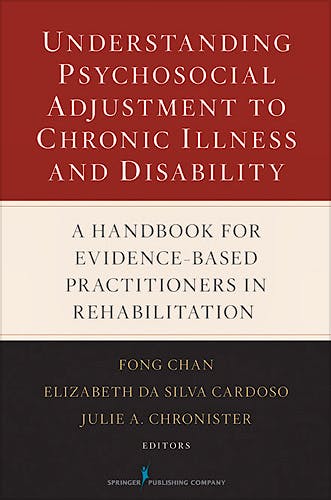

No hay productos en el carrito



Understanding Psychosocial Adjustment to Chronic Illness and Disability. a Handbook for Evidence-Based Practitioners in Rehabilitation
Chan, Fong
1ª Edición Junio 2009
Inglés
Tapa dura
384 pags
1100 gr
null x null x null cm
ISBN 9780826123862
Editorial Springer Publishing Co
LIBRO IMPRESO
-5%
142,15 €135,04 €IVA incluido
136,68 €129,85 €IVA no incluido
Recíbelo en un plazo de
2 - 3 semanas
This book provides in depth coverage of the major psychosocial and stress process theories and interventions, and explores how these models and techniques can be applied to rehabilitation populations.
In addition, the book covers important issues in the adjustment process of persons with disabilities and chronic illness (e.g., stigma, societal attitudes, sexuality), and offers chapters that explore psychosocial adjustment within the context of positive psychology, psychiatric rehabilitation, and persons with substance abuse issues. Finally, the chapters are written from an evidence-based practice perspective, emphasizing the empirical basis of the models and interventions explained, and their effectiveness with rehabilitation related populations.
Key Features:
- Provides an in depth review of psychosocial and cultural issues, healthcare and disability systems, medical, and functional and environmental implications of disability
- Discusses the empirical basis of the models and interventions explained, as well as their effectiveness with rehabilitation related populations
- Includes ancillary materials include an instructor's manual with a syllabus, examination items, PowerPoint presentations for each chapter, and answers to class exercises
Table of Contents
Preface
Section I: Introduction
1. An Introduction to Evidence-Based Practice Approach to Psychosocial Interventions
for People with Chronic Illness and Disability
Section II: Psychosocial Adjustment to Chronic Illness and Disability: Concepts,
Models, and Research
2. The World Health Organization ICF Model as a Conceptual Framework of Disability
3. Psychosocial Adaptation to Chronic Illness and Disability: Models and Measurement
4. Models, Research, and Treatment of Co-Existing Depression for People with
Chronic Illness and Disability
Section III: Relevant Mediators and Moderators of Psychosocial Adjustment
to Chronic Illness and Disability
5. Coping and Rehabilitation: Theory, Research and Measurement
6. Social Support and Rehabilitation: Theory, Research and Measurement
7. Family and Adaptation to Chronic Illness and Disability
Section IV: Intervention Strategies
8. Positive Psychology and Psychosocial Adjustment to Chronic Illness and Disability
9. Application of Self-Efficacy Related Theories in Psychosocial Interventions
10. Wellness and Promotion of Health in Chronic Illness and Disability: Theoretical
and Practical Models for Assessment and Intervention
11. Psychopharmacology: A Review of Current Treatment Options
Section V: Societal Attitudes Toward Disability
12. Societal Attitudes Toward Disability: Concepts, Measurements, and Interventions
Section VI: Special Issues
13. Psychiatric Rehabilitation
14. Substance Abuse: Models, Assessment, and Interventions
15. Sexuality and Disability
16. Multiculturalism and Adjustment to Disability
Section VII: Outcome Measurements
17. Quality of Life and Psychosocial Adaptation to Chronic Illness and Disability
Author Biographies
Fong Chan, PhD, is a professor in the Department of Rehabilitation Psychology and Special Education, University of Wisconsin-Madison. Dr. Chan is a licensed psychologist and a certified rehabilitation counselor. He is also a fellow in the American Psychological Association and a National Institute on Disability and Rehabilitation Research distinguished research fellow. He has published more than 100 refereed journal articles and book chapters. He is also the editor of a textbook, Healthcare and Disability Case Management. His awards include two Research Awards from the American Rehabilitation Counseling Association; a James Garrett Distinguished Career in Rehabilitation Research Award from the American Rehabilitation Counseling Association; and an Educator of the Year Award from the National Council on Rehabilitation Education.
Elizabeth da Silva Cardoso, PhD, received her PhD in Rehabilitation Counseling Psychology from University of Wisconsin-Madison in 1997. She is an associate professor in the Department of Educational Foundations and Counseling Programs, Hunter College, City University of New York. She is a licensed psychologist and completed a one-year predoctoral psychology internship at Harvard University's McLean Hospital and a postdoctoral psychology fellowship at Yale University's Yale Psychiatric Institute. She also worked for two years as a vocational rehabilitation counselor in the Bronx after receiving her master's degree in counseling and rehabilitation counseling from Columbia University-Teachers College. She served as the President of the New York State Rehabilitation Counseling Association in 2002 and is currently on the executive board of the National Council on Rehabilitation Education and on the APA Committee on Disability Issues in Psychology. Professor Cardoso has published extensively in the areas of substance abuse assessment and rehabilitation, multicultural counseling, and evidence-based practice. She recently received a National Science Foundation grant to help increase the capacity of people with disabilities from minority backgrounds in the sciences, technology, engineering, and mathematics fields.
Julie A. Chronister, PhD, is an assistant professor and rehabilitation counselor training program faculty member in the Department of Counseling at San Francisco State University. She received her PhD in Rehabilitation Psychology from University of Wisconsin-Madison in 2004, her Master's degree in Rehabilitation Counseling from University of Massachusetts-Boston, and her Bachelor's Degree from Boston University. Her teaching areas include the counseling process and psychological assessment, and her research interests include social support and coping within the context of psychosocial adjustment to disability and chronic illness, and the training needs of rehabilitation counselors. Her present research is focused on the role of social support and coping in mediating internalized stigma among persons with psychiatric disabilities. She has written several rehabilitation related articles and book chapters and has a track record of submitting and receiving grants for rehabilitation services and research projects. She is an editorial consultant/reviewer for five rehabilitation and allied health peer-review journals and served as the President of the New York State Rehabilitation Counseling Association in 2005-2006. Dr. Chronister has worked in the field of rehabilitation counseling for over 15 years in a number of capacities including rehabilitation counselor, community-based program director, and rehabilitation counseling faculty. She has clinical experience working with adolescents and adults with a wide array of disabilities in inpatient, outpatient, and community-based settings.
© 2025 Axón Librería S.L.
2.149.0